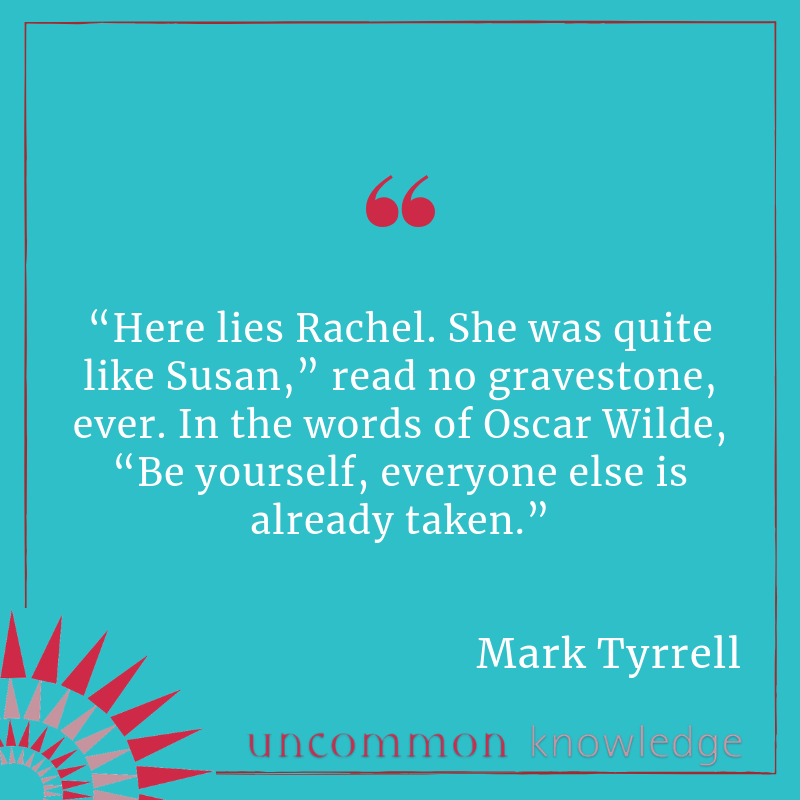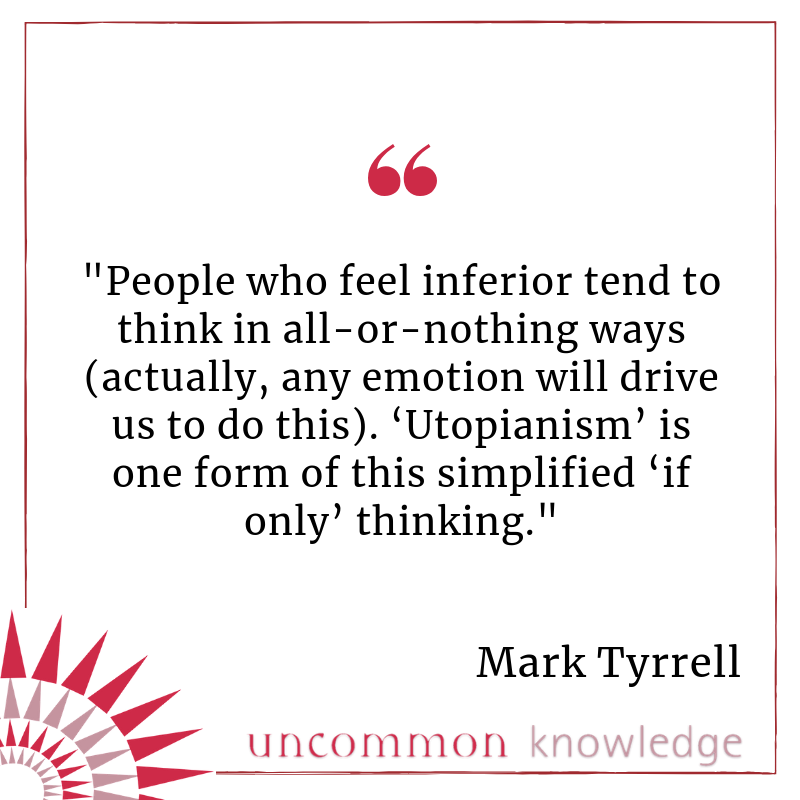
Reasons for feeling inferior can be difficult to articulate however they can still create strong emotions
“Never think that you’re not good enough. People will take you very much at your own reckoning.”
– Anthony Trollope
Tammy, 19, felt “inferior”. That’s what her mum told me when booking her appointment.
As I got up to answer the startling call of the doorbell, I mused that feeling inferior can only be done through comparison. We can only feel inferior in relation to something or someone else.
As I opened the door I further reflected that for feelings of inferiority to be “a complex” (as Tammy’s mother described it), we need to feel emotional about feeling inferior. I know I’m an inferior mathematician to, say, Manjul Bhargava, but I have no particular feelings about that. Good for him, I say. Feeling inferior, then, is different from objectively knowing that we might be inferior to someone in a particular way.
Prefer to watch instead?
Time to stop my musings and focus outward. I smiled at Tammy and welcomed her. She was diffident but friendly. I wanted to know what the problem was from her perspective.
If you’re looking for personal help, I’ve created a download on inferiority complex which you can get here.
On never feeling good enough
“I feel anxious a lot of the time.” Was that a subtle crack in her voice, a bottled-up sob?
“What do you feel anxious about?” I asked. The deep sadness I saw sitting dolefully within such young eyes left me feeling a little emotional myself.
“I feel as if I can never be good enough. When I see others… I know you’re not supposed to compare yourself… but I think I’m ugly and stupid…”
Feeling inferior is intrinsic to low self-esteem, but here I want to focus more specifically on what’s been called ‘comparanoia’ – constantly comparing yourself to others, and finding yourself lacking.
So how do people get to feeling less than others or less than they ‘should’ be?
Anatomy of the inferiority complex
Confidently knowing that Usain Bolt can run faster than you is not the same as feeling inferior unless you really, really care about that. A real inferiority complex has us feeling that:
- We should be as good as others.
- We are not as good as others, but we don’t really know why that is.
It’s a generalized feeling of inadequacy not based on rational judgements. Tammy found it hard to articulate why she felt inferior. It wasn’t a cognitive thing, it was an emotional sense she carried with her, privately and painfully. The emotions of feeling inferior comprise:
- Anxiety: A fear of somehow being ‘found out’ or unmasked as completely inadequate; a sense of imposter syndrome even when you are achieving good things in your work or social life.
- Hopelessness and helplessness (two key ingredients of depression): Feeling that whatever you do you just can’t be as good as you’re supposed to be, or as other people seem to be. No matter how well you do, it still won’t be good enough. Even high achievers can feel like failures.
- Anger, defensiveness, resentment and envy, and possibly guilt about those feelings.
Tammy said she often felt “ugly”. Objectively she certainly wasn’t, but that’s the nature of the beast. Feeling ugly can be totally disconnected from the objective perception others have of you, and of course any evidence to the contrary can easily be rejected or rationalized away – indeed, it must be if the inferiority complex is to survive.
But Tammy repeatedly told me she just felt “not good enough”. She found it hard to be specific at first, but then it’s always hard trying to articulate feelings when they have no real basis in thought.
So where might an inferiority complex originate?
How to feel inadequate
In a world that encourages us to buy stuff because we’re “worth it” while simultaneously force-feeding us airbrushed perfection, it’s easy for an inferiority complex to take hold.
We’re told it’s what’s inside that counts, but we’re saturated in the outside of people’s seemingly exciting, rewarding, beautiful lives. We are drowning in the fantasy while being told it doesn’t matter.
In a way, if we believe in lifelong self-improvement, none of us are good enough. We haven’t measured up to everything we could be – at least, not yet.
But self-objectivity, knowing our own shortcomings and seeking to improve them, is not the same as feeling emotional about ourselves or, as Tammy sometimes did, self-despising. She had self-harmed in the past and had also been through periods of bulimia.
Maybe a client has been told they weren’t good enough by a parent. One woman I know was repeatedly told by her mother that she was the “ugliest girl in the street” and no one liked her! Or maybe they have been constantly compared to other people: “Why can’t you be more like your sister?” Other people might feel inferior because they are perfectionists; they feel that anything less than perfection is inadequate.
Being at war with the self is painful. We always need to be on our own side. To be our own support and encouragement.
But there’s something else.
Peeking at the lives of others
How good-looking are you? How tall? How rich? How smart? How popular? How deeply loved and adored?
We can only be tall or short, rich or poor, attractive or ugly in comparison to others. In a world with a population of one, ‘good-looking’ would have no meaning at all.
A hundred and fifty years ago, you would have known your neighbours and a few other locals, who would probably have been similar to you in many ways. You may have been vaguely aware of a few famous people, but that was it.
Today’s world is a very different place. Now, we can glide silently through the lives and status updates (‘status’ being the operative word) of much of the world, not least of all the rich and airbrushed.
Tammy was spending four to five hours a day on social media. She admitted it often made her feel sad, ugly and generally inferior but she felt pressured to be on there.
Researchers at Glasgow University have found that night-time usage of social media is associated with poor sleep, lower self-esteem and increased anxiety and depression(1).
And it’s no wonder. Constant monitoring of how many – or how few – ‘likes’ or positive responses they are getting on social media can train young people to become dependent on the approval of others and depressed when it isn’t forthcoming. Such dependence on outside approval is a recipe for unhappiness and poor emotional adjustment(2).
Of course, there are many advantages to social media, but like any tool, it can be misused, or even, in the case of cyberbullying, weaponized.
But we’re not defenceless. If we can only relax our expectations as to how we ‘should’ be and understand that the way others present themselves to the world is heavily edited, then we can relax about how others seem to be and how we seem to them. And I’m not just talking about online.
This was my challenge with Tammy.
So what can we do for a client with an inferiority complex?
Tip one: Deal with emotional memories
Having an inferiority complex means having an array of unhappy feelings, some of which will fuel thoughts. Helping people examine their own thoughts, widen their perspective and challenge emotional thinking (which is always restricted) can be valuable and effective.
But when the feelings are really strong, it can be easier to deal with them directly. When we do this, our thoughts tend to naturally become fairer and more moderate.
I asked Tammy to hone in on the feeling of “never being good enough”. With closed eyes, she focused on the feeling. It wasn’t hard for her to access it.
Next, I asked her if the feelings produced any particular memory in which she’d had similar feelings. This is known as the ‘Affect Bridge’ technique. She thought for a moment and said no, but eventually a painful memory of being teased and tormented at school when she was eight years old came to mind.
Now I asked her to open her eyes and focus on a time she felt good. Once she had accessed these resourceful feelings, I had her go back to that day at school, watch it calmly from the outside, and, as her adult self, comfort her eight-year-old self and “sort that time out”. She reported feeling very calm with that memory after we used this ‘helping hand technique’.
We did this with all kinds of painful memories, and with time the pattern began to change. You can watch me do this technique with my low self esteem client Emily inside Uncommon Practitioners TV. In her case, the old memory was of having books thrown at her at school when she’d tried to speak.
Next, we can remind our clients that only they can be them. When this idea hits home as a feeling, not just a “yeah, yeah, I know” thought, the impact can be profound.
Tip two: Drop the mime
“Here lies Rachel. She was quite like Susan,” read no gravestone, ever. All Rachel can be is Rachel (or the best possible version of herself); she’s not ever going to be Susan. In the words of Oscar Wilde, “Be yourself, everyone else is already taken.”
Wanting to look like, sound like, live like, and be someone else is to abandon what makes us unique. How can an impersonator ever be true to themselves?
Plastic replica lives don’t make people happy. That’s not to say we can’t learn from others. But being inspired by someone means assimilating some of their traits into who you are. It doesn’t mean trying to have their exact same life.
Inferiority complexes thrive on people wanting to be someone they’re not. This doesn’t mean we have to limit ourselves as to what we can do or accomplish in life, but it does mean that we can get by much better when we don’t try to be someone else.
I talked about ‘plastic lives’ to Tammy, and I also used other metaphors, analogies and hypnotic storytelling to help her broaden her sense of herself as herself, not some inadequate copy of anyone else. We can also help our clients in another way.
Tip three: Get specific
Tammy wasn’t too specific about why she felt inferior, other than feeling “ugly” even though she “knew” she wasn’t. But it can sometimes be useful to get specific with clients. What exactly have they been feeling inferior about?
Emotional thinking is always sloppy and all-or-nothing. So we can help our clients ‘tighten’ it up to make it less emotional. There are around seven billion people on this planet (last time I counted). Which ones does your client feel inferior to? Rich people? Good-looking people? Academic people? ‘Accomplished’ people (whatever that means)?
Most people aren’t these things, at least not in any extreme way. Is your client being too being selective as to whom they compare themselves with?
If I just compare myself to Nobel prize winners, I will certainly see a bit of a gulf between their achievements and mine. On the other hand, if I compare myself to people I feel have achieved less than me, maybe I could be a bit less harsh on myself. Or here’s a thought: maybe I could just drop it altogether.
Which leads me onto the next intervention.
Tip four: Dare to be different
Life is much less restrictive than it used to be in westernized countries. In the ’50s, you were expected to be married (in your early twenties at that!); to have kids and a ‘respectable career’ (grave robbers need not apply); to have short hair or long hair, depending on gender; to dress ‘properly’; to have all the right opinions. We haven’t cast aside all these norms, and I’m not even suggesting they are all bad, but people are much freer now to live a bit differently.
No one is a ‘failure’ if they are unmarried at forty (or eighty, for that matter), or if they don’t have kids or a traditionally professional career. Not in terms of current societal norms, though your parents may still have some backwards expectations.
The kind of thinking that prompts “Oh no! I’m forty-five now. I should have a mortgage, a partner, 2.4 children! I should be how other people are!” is a trap. If you really want these things, that’s one thing; but if you only ‘want’ them because you feel they are expected of you, then remember this: your life can only be lived by you.
So we can encourage our clients to explore what they want to do as distinct from what they feel they are or were supposed to do.
“What do you think?”
“What do you want?”
These are the questions I kept asking Tammy. I wanted to get to the bottom of what she wanted, not what she thought she should want or what other people expected. She said she felt “validated” by this, but really all I was doing was addressing her: the one and only Tammy.
It’s also useful to look at just what a client may be expecting.
Tip five: Oust the Utopian assumptions
People who feel inferior tend to think in all-or-nothing ways (actually, any emotion will drive us to do this). ‘Utopianism’ is one form of this simplified ‘if only’ thinking.
- “If only I was 20 pounds lighter, then I’d be confident and happy!”
- “If only I earned ten thousand more a year, then my life would be good!”
- “If only I could be exactly like Bob, then I’d feel great about my(him)self!”
Life doesn’t work like that. Sure, you might have more confidence if you lose 20 pounds, at least for a while. But because much of what we feel inferior about is relatively superficial, band-aid remedies will always leave the non-superficial part of us wanting.
Even if I earn a million a year, it won’t be long before I start thinking, “If only I earned two million…” Why? Because I still haven’t satisfied what I actually need as a human being.
We all have deeper needs, and until those needs are met there may be an aching disconnect between what we feel we want and what we really need. Whole lifetimes might be predicated on this mismatch and the bewilderment and lack of fulfilment it causes.
On being Tammy
Chronic ‘comparanoia’ tends to drop away quite naturally when we begin to live in more sustainable ways. We do this by meeting our needs for real meaning, purpose, and genuine connection to others.
I worked long and hard with Tammy to help her overcome past emotional conditioning and to start meeting her primal emotional needs in balance. In hypnosis we rehearsed her caring less about what others might or might not think and challenged the learned thinking that had been causing her problems for so long.
I also encouraged and helped prepare Tammy for downtime from social media. She cut it down to no more than 90 minutes a day and sometimes much less. We mentally rehearsed her being much less bothered by what she read and saw when it seemed to reflect badly on her by comparison, and feeling and being more socially spontaneous.
Tammy has become happier and less anxious, and she says she “feels freer”. She has started to see differences between herself and others not in terms of ‘better’ or ‘worse’, but just as differences.
After my last session with Tammy she sent me a clip from Youtube: a song by The Kinks called ‘Plastic Man‘.
She says she will live her life as a flesh-and-blood, unique, “perfectly imperfect” person. She is the only Tammy there ever was, is, or will be. She will never be a plastic copy of what other people expect.
For more on treating low self esteem, see my course: How to Lift Low Self Esteem in Your Clients
Notes:
(1) http://www.gla.ac.uk/news/archiveofnews/2015/september/headline_419871_en.htm
(2) http://online.liebertpub.com/doi/abs/10.1089/cpb.2006.9.584









